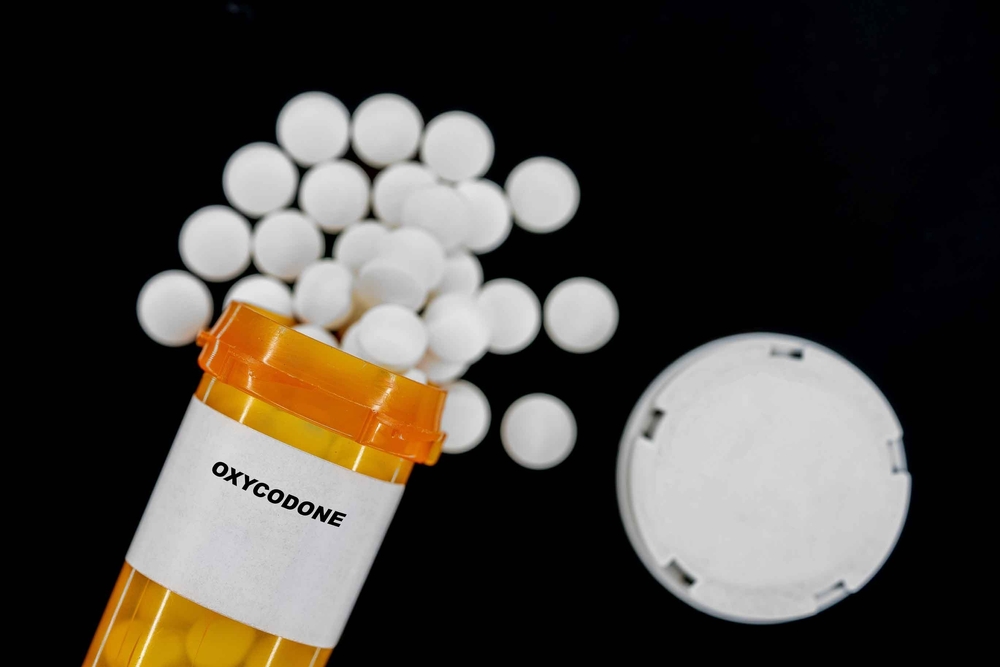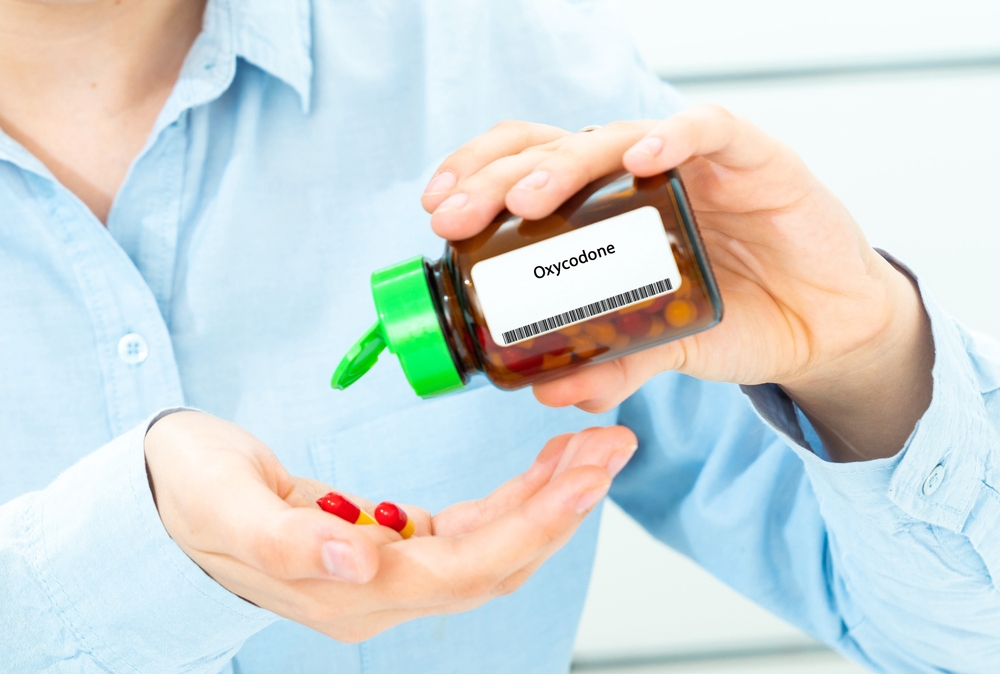Last Updated:
July 21st, 2025
Oxycodone Addiction | Symptoms, Effects and Causes
The opioid crisis in the US has become a devastating example of how easily things can go wrong with medications meant to help us. Oxycodone is widely agreed to be the source of much of the pain, with the drug becoming infamous for addiction and loss. In the UK, while we haven’t experienced the crisis to the same extreme as the US, the situation serves as a stark reminder. The potential for oxycodone addiction remains a significant concern, but understanding the risks, signs and potential recovery options can help prevent a similar tragedy from unfolding on our shores.

What is oxycodone?
Oxycodone is a powerful painkiller derived from opium that is often prescribed for intense pain that other medications can’t alleviate. It is particularly useful after surgeries, for severe injuries and sometimes for ongoing pain conditions.
Oxycodone can be delivered in various ways, including orally as a pill or directly into the bloodstream via an injection. The quickest pain relief comes from intravenous (IV) administration, which is typically used in hospitals post-surgery and for major injuries. Oxycodone is also used in hospice care to manage intense pain and assist with breathing difficulties, providing critical comfort in end-of-life care.
Despite these benefits, various side effects of oxycodone have made it a Class A drug in the UK. These include:
- Drowsiness
- Constipation
- Nausea and vomiting
- Dizziness
- Itching
- Dry mouth
- Sweating
- Dependence and addiction
What is OxyContin?
OxyContin was developed by Purdue Pharma in the 1990s and it was touted as a breakthrough advancement in pain management. It has a unique time-release formula which was designed to provide safe, extended relief from chronic pain.
At first, this seemed to provide a solution to the addictive risks that come with oxycodone. In retrospect, however, the approval of OxyContin came to be sharply criticised, with the former FDA director labelling it as “the greatest mistake in medical history.”
The problem was that while Purdue claimed OxyContin’s slow-release formula reduced the risk of addiction, this wasn’t actually true. Aggressive marketing and financial incentives for prescribing doctors saw OxyContin administered to tens of millions of people across the US for even minor pain. Millions of cases of OxyContin addiction soon followed, as well as tens of thousands of drug-related deaths.
What is oxycodone addiction?
Oxycodone addiction happens when someone can’t stop taking oxycodone, even if they want to. Oxycodone is misused in several ways. Some people start using it for fun, often crushing the pills and snorting or injecting them (a simple method of getting around OxyContin’s extended-release design). Others might use oxycodone on their own to deal with pain or tough feelings. Quite often, however, oxycodone addiction begins with a genuine prescription.
In all cases, as you use oxycodone more, your body starts getting used to it, and initial doses become less effective. This is called building tolerance, and what starts as a small amount can begin to escalate.
As the use of oxycodone increases in both dose and frequency, the body and brain start to depend on it just to feel normal. This kind of dependence on oxycodone means that if it’s suddenly not available, it feels like you are missing something important. Your systems then react negatively, causing withdrawal symptoms and compelling you to keep taking oxycodone simply to avoid feeling unwell.
However, the struggle isn’t just with the body’s cravings, as the mind can get hooked too. Over time, you may find yourself using oxycodone as a stress reliever or to help you sleep. This daily reliance causes continuous misuse long after the original pain has faded or the buzz has lost its glow, even as problems begin to mount.
Spotting the warning signs of oxycodone addiction
If you are worried that you are losing control, here are some potential warning oxycodone addiction signs and symptoms which need addressing immediately:
- Going from one doctor to another to get extra prescriptions.
- Obtaining it illegally is a serious issue in the UK since Oxycodone is a Class-A drug.
- Avoiding friends or family who’ve expressed concern about your use.
- Always feeling wiped out, foggy or struggling to concentrate.
- Spending money on oxycodone even when it’s putting you in financial trouble.
- Feeling jittery, anxious or sick if you can’t take it.
- Carrying on with Oxycodone use, even though it’s clearly making things worse in your life.

If these oxycodone symptoms sound familiar, it is time to get professional help for oxycodone addiction. This can be scary, but the sooner you get started, the sooner you can start repairing the damage and rebuilding your life.
What causes oxycodone addiction?
Being aware of the risk factors for oxycodone addiction is important both for potential users and anyone prescribing it. Oxycodone’s effects make it chemically addictive, but here are some other factors that can increase the risk:
- How oxycodone is taken: Taking more pills than prescribed, for longer than prescribed or in ways it wasn’t meant for, like crushing it to snort, all up the addiction risk.
- Personal health issues: If you have had addiction problems before or struggle with things like anxiety or depression, oxycodone could become a go-to comfort that becomes hard to quit.
- Lack of supervision: Not having a doctor keeping an eye on how oxycodone is used can make it easy to start abusing it.
- Family history: Just like some traits run in families, so can the tendency to get addicted. If your family has a history of this, being extra cautious with medications like oxycodone is key.
- Stressful environments: Tough daily life, stressful situations at home or school or living in a challenging area can all push someone towards using oxycodone as an escape.
What are the mental and physical dangers of oxycodone addiction?
Oxycodone addiction can cause serious harm, not just to the person using it but also to those around them. On a personal level, some of the most worrying risks include:
How to overcome oxycodone addiction
Treating addiction is a step-by-step process that initially revolves around oxycodone detox. The idea is that under close medical supervision, you gradually reduce your intake of opioids. This helps minimise the body’s shock to the absence of the drug, which may be further cushioned with a safer substitute like methadone.
Once you are no longer physically dependent on oxycodone, the focus turns to understanding why and how you became addicted. This is done through oxycodone rehab with both private rehab centres and free NHS services available up and down the country.
How to get help for oxycodone addiction
If you are grappling with oxycodone addiction, effective help is within your reach. At Addiction Helper, we can help find the right treatment options for you. We encourage you to reach out to us today so we can guide you towards the first steps.
Our compassionate team are ready and available to take your call, and guide you towards lasting the lasting addiction recovery you deserve.
Frequently Asked Questions
(Click here to see works cited)
- Stewart, Conor. “Number of deaths from drug poisoning by oxycodone in England and Wales from 2001 to 2022.” Statista, 29 January 2024, https://www.statista.com/statistics/470907/death-by-oxycodone-drug-poisoning-in-england-and-wales/. Accessed 15 January 2025.
- UK Addiction Treatment Centres. “OxyContin addiction | Vicodin abuse signs and symptoms | UKAT.” UK Addiction Treatment Centres, 5 December 2023, https://www.ukat.co.uk/addiction/drug/prescription/opiate/oxycontin/. Accessed 15 January 2025.
- UK Rehab. “Oxycodone Addiction | Causes, Symptoms and Diagnosis.” UK Rehab, https://www.uk-rehab.com/prescription-drug-addiction/opioid/oxycodone/. Accessed 15 January 2025.

